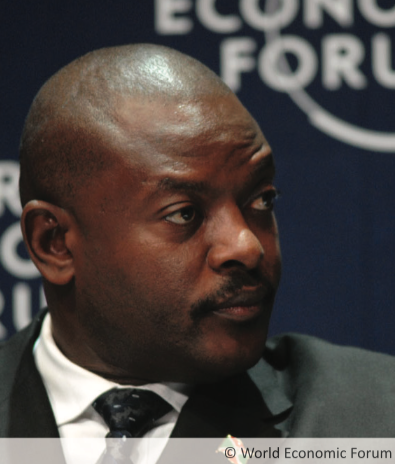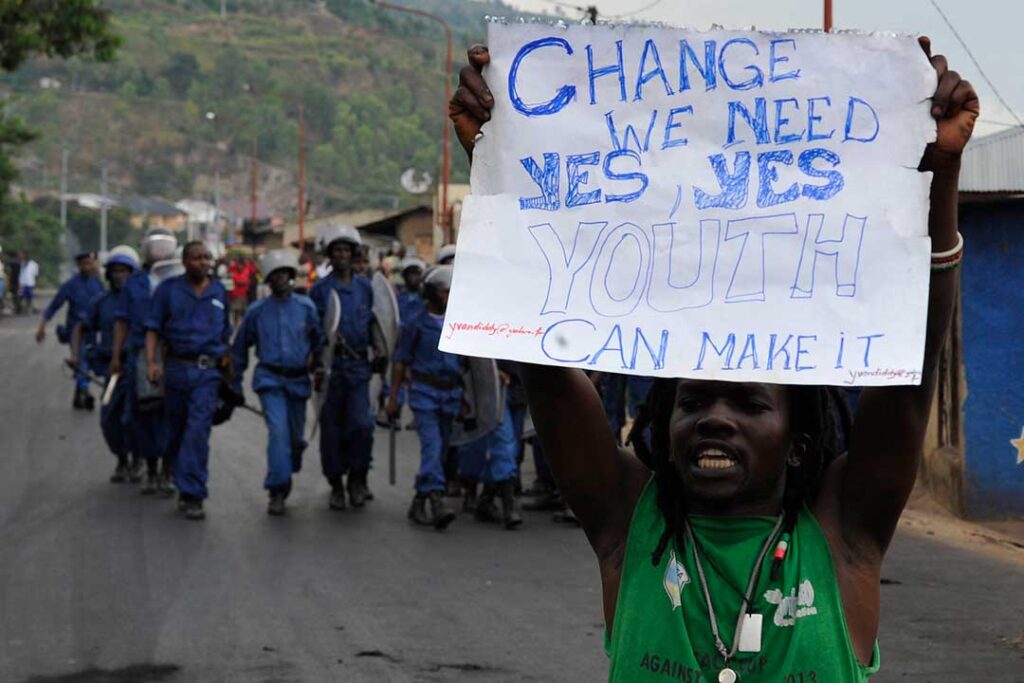Burundi’s shrinking political space
Government undermines the opposition at every turn
Tension is mounting in Burundi ahead of presidential, legislative and municipal elections scheduled for 2015. The opposition, the press and other government critics are finding their political space increasingly narrowed by new laws that forbid public gatherings and restrict the media.
In June a restrictive press law was passed. A draft law imposing tight controls on non-profit organisations poses a further threat to free expression. The ruling party’s youth wing are intimidating, harassing, raping and killing members of the political opposition with impunity, according to international human rights groups. Proposed changes to the constitution to allow the president to run for a third term, although defeated by one vote, threaten to reverse gains made in consolidating Burundi as a peaceful and democratic nation. A new law governing land is considered by many to have an anti-Tutsi bias, further fuelling ethnic unrest.
Since independence in 1962, rivalries between the usually dominant Tutsi minority and Hutu majority have plagued this tiny east African country, sometimes spilling over into the neighbouring Democratic Republic of Congo and Rwanda. When Tutsi extremists assassinated Hutu politician Melchior Ndadaye three months after he was elected president in a 1993 election—Burundi’s first multi-party poll—the country began its slide into a 16-year civil war.

The war officially ended in 2009. The following year Burundi held its second election by universal suffrage. After the municipal polls, five leading opposition parties complained of vote rigging and withdrew from the presidential and parliamentary elections. This left the door open for Pierre Nkurunziza and his National Council for the Defence of Democracy–Forces for the Defence of Democracy (CNDD-FDD, from its French initials) to win unopposed.
After the 2010 elections Burundi “experienced two years of instability and violence…generally blamed on the activities of the CNDD-FDD youth wing, the Imbonerakure[meaning “those that see far”], the intelligence services and the police,” according to a July 2014 report from the Institute for Security Studies (ISS), a South African-based think-tank. “Most opposition leaders fled the country, leaving a political vacuum.”
Once hailed as a peace-building success story, this east African nation of nearly 10m people spun into uncertainty in February 2014, after the junior party in the governing coalition, the Tutsi-led Union Pour le Progrès National (Uprona) quit the Hutu-led government, raising fears of new ethnic unrest. Bernard Busokoza, Burundi’s vice-president and a leading Uprona member, had opposed the proposed amendment to constitutional term limits. The president sacked him.
This follows a pattern that has emerged in the last decade in which Mr Nkurunziza has politicised state institutions such as the police and army and has stifled the opposition’s ability to challenge the ruling party, according to the ISS. Ethnic Tutsis also accuse a government-appointedland commission of ruling in favour of Hutus. “Tensions are compounded by limited economic growth…and limited infrastructure,” the ISS report stated.
Burundi is one of the world’s poorest nations, with a per capita income of $280 in 2013, according to a 2014 World Bank report. It is also one of the hungriest, according to the 2014 Global Hunger Index, an annual report published by the Washington, DC-based International Food Policy Research Institute, Welthungerlife, a German NGO, and Concern Worldwide, an international humanitarian organisation. The UNDP reports that 58% of children in Burundi face chronic malnutrition.
Since narrowly defeating the constitutional amendment in March, opposition MPs claim the government has deployed local authorities and police to harass, intimidate and split their parties. “Opposition leaders are victims of judicial harassment,” said Léonce Ngendakumana, chairman of the Alliance of Democratic Change (ADC-Ikibiri), a coalition of eight opposition parties.
On October 2nd Mr Ngendakumana was sentenced to a year in jail and fined $600 for slander after writing to UN chief Ban Ki-Moon. In his letter he warned of an impending genocide in Burundi, based on the attacks by the CNDD-FDD youth wing party against opposition members. He remains free pending an appeal.
Another opposition leader, Agathon Rwasa, is not only battling a pending criminal case, but also what he claims is the ruling party’s deliberate split of his party, the Forces for National Liberation (FNL). The Congolese Tutsi community filed a criminal complaint against Mr Rwasa in August last year over his alleged involvement in the killing of 166 refugees in August 2004.
After his party came second in the 2010 municipal poll with 15%of the votes, he boycotted the presidential poll and then fled the country, citing fears for his safety. His FNL colleagues fired him shortly after his departure. Although he returned in August 2013 after a near two-year absence, the FNL elected another leader in October 2013.
Mr Rwasa, however, denounces this move as a ruling party ploy and claims he is still the legitimate FNL chairman. “The interior minister has ordered all local government authorities across the country…to stop me from meeting my supporters,” he said. “The ruling party is using all kinds of strategies to make sure the reunification process of [the FNL] does not take place.”
The Tutsi-dominant Uprona is also divided by internal disputes that it claims the ruling party has created.
“Political parties that can compete with the CNDD-FDD have been split into two factions, one of which is backed by the ruling party,” said Tatien Sibomana, spokesman for a faction of the Tutsi-led Uprona party. Opposition parties have been either “destabilised or simply dismantled”, he said.
In addition to Uprona and the FNL, the Union pour la démocratie (UPD) has also split into rival factions. The government suspended the Mouvement pour la solidarité et la démocratie (MSD) between March and August this year, after clashes with police. A court sentenced 21 MSD members to life in prison for “insurrection”. Another ten were sentenced to ten years and 14 were sentenced to five. The MSD chairman and former radio journalist Alexis Sinduhije escaped police custody and fled to Belgium. Burundi’s government has issued an international warrant for his arrest.
In June the government adopted a restrictive press law that threatens the protection of sources and restricts the subjects on which journalists can report. Under the new law, journalists can be prosecuted and made to pay heavy fines for reporting about issues such as the economy or national security.
Burundi’s government denies that it is dividing the opposition or curbing freedom of expression and assembly. “Every day in the media we hear opposition parties and civil society criticising government’s actions, even criticising the head of state, without fear,” said government spokesman Philippe Nzobonariba.
Political observers reject the government’s line. “Ahead of the 2015 elections, the ruling CNDD-FDD is doing everything it can to weaken opposition parties that might challenge it,” said Achille Barancira, a political science lecturer at Université Lumière, a private university in Bujumbura, the capital. “When one is in power, one wants to stay there and all means are useful for that purpose,” Mr Barancira said.
But Mr Barancira did not heap all the blame at the government’s door. Instead he criticised opposition party members who are easily bribed.
Mr Barancira expressed serious concerns about the fairness of the 2015 elections scheduled for May and June 2015. “What kind of credibility can we give [to elections]…in which all serious candidates will be either in prison or still in exile?” Mr Barancira asked.
While the government refuses its opponents the political space to operate, anger will mount—and the 2015 elections could be a powder keg that sees this anger explode and spread into neighbouring countries. To insure that Burundi’s hard-won peace is not shattered, Mr Nkurunziza urgently needs to open up the political space and renew his commitment to the democratic freedoms of expression and assembly.



